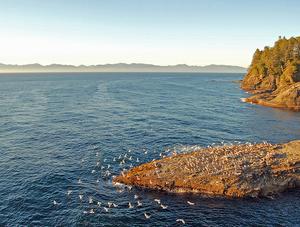First Ocean Acidification Lawsuit Filed Against EPA
SEATTLE, Washington, May 14, 2009 (ENS) - The nonprofit Center for Biological Diversity today filed a lawsuit against the U.S. Environmental Protection Agency and Administrator Lisa Jackson over the agency's failure to recognize the impacts of ocean acidification on waters off the state of Washington.
Brought under the federal Clean Water Act, the lawsuit is the first legal action in the country to address ocean acidification. The case tests whether the reach of the Clean Water Act extends to the greenhouse gas carbon dixoide, CO2, as a pollutant.
"Ocean acidification is global warming's evil twin," said Miyoko Sakashita, an attorney with the Center for Biological Diversity's oceans program. "The EPA has a duty under the Clean Water Act to protect our nation's waters from pollution, and today, CO2 is one of the biggest threats to our ocean waters."
 |
The coastal waters off Washington's Cape Flattery, the westernmost point of the United States. (Photo by J.F. Moyer) |
Studies have found that ocean acidification hurts nearly every marine animal with a shell, including oysters, urchins, sea stars, and crabs. It weakens and dissolves the thin shells of certain plankton that form the base of the marine food web.
The lawsuit, filed in U.S. District Court in Seattle, seeks to compel EPA to amend Washington's impaired waters list to include any ocean waters that are failing to attain water quality standards as a result of ocean acidification.
The Clean Water Act requires states to identify as impaired those water bodies failing to meet federal water quality standards. The Act also requires the EPA to oversee the states' impaired waters lists, approve or disapprove state-submitted lists, and add any waters failing to attain water quality standards to the impaired list when those waters are omitted by a state.
On August 15, 2007, the Center for Biological Diversity submitted a letter formally requesting that Washington include ocean waters in its jurisdiction on the list of impaired waters due to ocean acidification, backed by numerous peer-reviewed reports on ocean acidification from scientific journals.
Yet, Washington's draft list failed to mention ocean acidification.
During the public comment period on March 20, 2008, the Center submitted comments and additional data reiterating its request that ocean water segments be added to the impaired waters list.
But Washington's final impaired waters listing decisions did not include any ocean water segments impaired by ocean acidification. Then the Center informed EPA of its duty to add ocean waters not attaining pH standards when reviewing Washington's impaired waters list.
On January 29, 2009, EPA approved Washington's list without adding ocean waters affected by ocean acidification.
As a result, the Center for Biological Diversity is asking the court to find that EPA's approval of Washington's impaired waters list violated the Clean Water Act and was arbitrary and capricious in violation of the Administrative Procedure Act.
"Ocean acidification is not some distant threat that can be shunted off to future decisionmakers. It has already arrived, and we have to acknowledge and deal with the problem right now," said Sakashita. "EPA has all the evidence it needs to act to begin protecting our waters from ocean acidification. Further delay is simply not justified."
Current EPA criteria, adopted by most states, require a finding of impairment if waters deviate more than 0.2 pH units from natural variation. This standard, adopted in 1976 before ocean acidification was recognized as a threat, is likely inadequate, says Sakashita, adding, "Ocean acidification is occurring so rapidly on the U.S. West Coast that Washington's waters already exceed this standard."
Scientists monitoring waters off the coast of Washington report that ocean acidification is already affecting seawater quality and marine ecosystems.
According to a 2008 report in the Proceedings of the National Academy of Sciences, since 2000 the pH of Washington's coastal waters has declined by more than 0.2 units, violating the state's water quality standard for pH.
Ocean waters have been listed before as impaired under the Clean Water Act. Sakashita explains that the states have jurisdiction over coastal waters out to three miles and states can put these waters on their impaired lists for submission to the EPA.
Once a water body is listed as impaired, the EPA or the state must set limits on the input of pollutants into these bodies of water to prevent further degradation. In this case, the Clean Water Act would require limits on carbon dioxide emissions that contribute to ocean acidification.
There is evidence that the EPA is beginning to consider the issue of ocean acidification. For the first time, the agency has invoked the Clean Water Act to call for data on the problem to use for evaluating water quality criteria under the Act.
Last month, in response to a petition from the Center for Biological Diversity, the EPA began a public process to determine whether its water quality criteria should be updated to reflect the impacts of ocean acidification.
Copyright Environment News Service (ENS) 2009. All rights reserved.
To subscribe or visit go to: http://www.ens-newswire.com